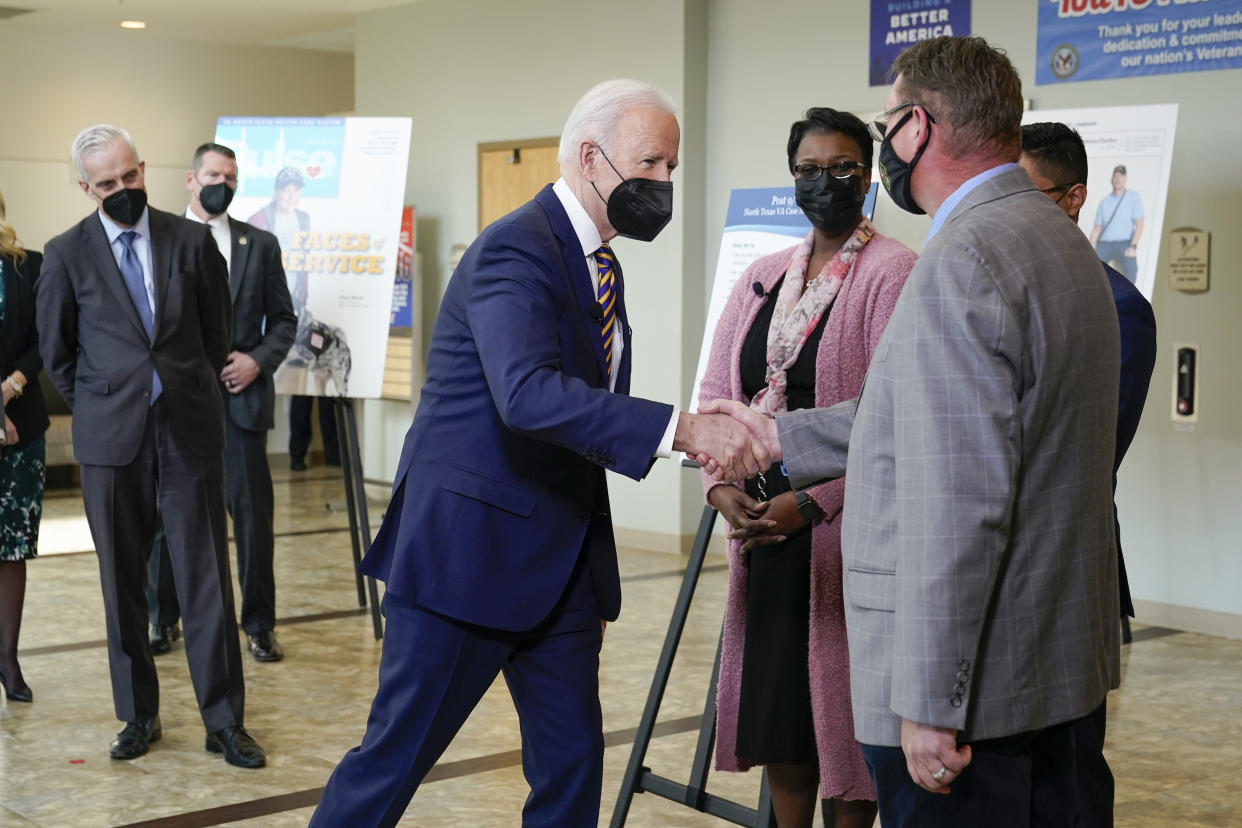Senate advances bill on veterans' burn pit care

- Oops!Something went wrong.Please try again later.
- Oops!Something went wrong.Please try again later.
A bill to cover millions of veterans’ care for cancer and lung problems linked to burn pits is heading to President Joe Biden’s desk after a final vote in the House next week, where it is expected to pass.
The Senate voted 84-14 Thursday to pass the Honoring Our PACT Act, H.R. 3967 (117), requiring broadened Department of Veterans Affairs coverage for toxic exposure related to burn pits. The vote brings the bill one step closer to law after years of advocacy from veterans support groups and health care organizations that have argued a range of health conditions from emphysema to glioblastoma, the cancer that killed Biden’s son, retired Major Beau Biden, can be linked to burn pits used to incinerate toxic waste for years at overseas military locations.
“This is the greatest advance in veterans’ health care in decades,” Senate Majority Leader Chuck Schumer (D-N.Y.) said on the Senate floor.
The bill's sponsor, Rep. Mark Takano (D-Calif.) said in statement that the House will vote again on the measure, which it passed in March, next week. Biden, who has pushed for recognition of burn pit health risks since the campaign trail, is expected to swiftly sign the bill into law.
The Congressional Budget Office has projected the legislation would increase federal spending by more than $300 billion over 10 years. That has drawn opposition from groups such as the nonprofit Committee for a Responsible Federal Budget, which has said it supports broader coverage but that it needs to be offset by other spending cuts.
The U.S. military stopped using burn pits at bases in Iraq, Afghanistan and elsewhere nearly a decade ago, but it estimates that at least 3.5 million veterans were exposed to enough toxic fumes to cause respiratory problems and some cancers. But even with that recognition, the Department of Veterans Affairs continues to deny a majority of disability claims linked to burn pit exposure.
Between 2007 and 2020, 12,582 veterans claimed conditions related to burn pit exposure, VA Deputy Executive Director of policy and procedures Laurine Carson told House lawmakers in September 2020. The agency approved 2,828, or roughly 20 percent of those claims.
A VA spokesperson pointed POLITICO to VA Secretary Denis McDonough's statement last month, where he compared the legislation's impact to the Agent Orange Act of 1991 that expanded coverage for more than 2 million Vietnam War veterans exposed to the dangerous toxin.
"We support the expansion of access to VA health care in the PACT Act and will work to ensure that the expansion of eligibility for health care does not result in the delay or disruption of care for those Veterans already receiving health care from VA," McDonough said.
The number of claims is expected to swell in the wake of the new legislation, which orders the VA to recognize that a dozen types of cancers, chronic pulmonary disease, asthma, emphysema and a score of other respiratory illnesses could be linked to burn pit exposure. The measure also would require VA providers to incorporate toxic exposures into patient questionnaires, which could bring in new patients unaware that their conditions could be linked to the pits.
“Toxic exposure is affecting countless veterans; some don't even know it yet,” said Jen Burch, communications associate for Iraq and Afghanistan Veterans of America. The bill will “remove the burden of proof from the veterans and ensure the 80 percent of veterans previously denied will now have the benefits they have earned,” she added.
The VA has struggled to shorten veterans’ wait time for existing benefits. Service members on average wait 100 days for benefit compensation; more than 250,000 wait longer.
The longtime benefit delay fueled a pilot technology program, launched in January, to shorten wait times by automating some processes and removing steps such as unnecessary doctor visits. For now, the pilot program is focused on monitoring high blood pressure.
Rob Reynolds, the VA official leading the project, told POLITICO earlier this year that benefits adjudicators using this type of technology resolved cases in an average of 21 days. The VA plans to expand the program to other health conditions such asthma, which could overlap with efforts to broaden burn pit coverage.
Enacting the law is just the beginning, Sen. Jerry Moran (R-Kans.), ranking member of the Senate Veterans' Affairs Committee, said on the Senate floor. “A lot of work remains, and the fact is that VA has significant challenges as it moves forward to help these veterans.”
Republican Sens. Richard Burr and Thom Tillis of North Carolina, Mike Rounds and John Thune of South Dakota, Richard Shelby and Tommy Tuberville of Alabama, Mike Lee and Mitt Romney of Utah, Rand Paul of Kentucky, James Lankford of Oklahoma, Cynthia Lummis of Wyoming, and Mike Crapo and James Risch of Idaho voted against the bill.
CORRECTION: A previous version of this article misstated the next step for the legislation. It must return to the House for another vote before final passage.
CORRECTION: This story has been updated to correct the military rank of the late Beau Biden.

